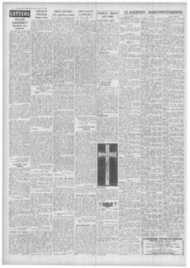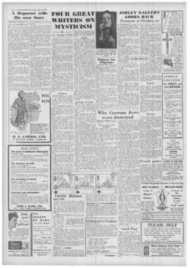Page 3, 19th May 1950
Page 3

Report an error
Noticed an error on this page?If you've noticed an error in this article please click here to report it.
Tags
Share
Related articles
Wolff( The Actor Mr, Donald Wolfit Has Come Back To
MR. WOLTIT AND KEAN'S GHOST
WHEN Edmund Kean, in 1816, acted Sir Giles Overreach in
Massinger's A New Way to Pay Old Debts, at Drury Lane, the effect upon his company and audience was unique.
" The pit rose bellowing "; Lord Byron fell to the floor writhing; Munden, petrified by terror, dropped like a dead man and was dragged from the stage by the shoulders; several ladies fainted. " Mrs. Horn breaking into hysterical tears."
The human values that informed Massinger's work are more familiar now than then; Hazlitt confessed that " we do not know any one ... who could write " it. The violence, corruption. and greed of a Jacobean milieu reflected by Messinger finds its contemporary parallel in a type of popular thriller. From the opening line of dialogue, A New Way To Pay Old Debts reads like an early seventeenth century Peter Cheyney or Dashiel Hammett : Wellborn: No bouse? nor no tobacco?
Tapwell: Not a suck, sir: nor the remainder of a single can left by a drunken porter . . . Translate the words into American, make Wellborn a disillusioned detective, from out-of-town, Tapwell the proprietor of a road-house and we have the opening of a cerebral charade set in the dingy urbanism that serves a current literary fashion.
It was inevitable that Mr. Donald Wolfit (Richmond Theatre) should essay this role. Sir Giles is a testpiece; like Lear and Volpone. on different planes. a measuring rod for actors. The part is a study in pure evil; to borrow a phrase from Mr. Bruce Marshall, Sir Giles is an " allout sinker."
He robs widows and orphans; he swallows his neighbours' estates with the insatiable maw of a democratic Government ; to gratify his lust for position, he barters his daughter ; with his sword he is quick on the draw. No gangster looks more blandly to taking his rivals " for a ride " than Sir Giles looked to his blade. "Does there use a man . . . can truly say I e'er gave inch of ground not purchased with his blood that did oppose me .. ."
THE OLD SHADE
Mr. Wolfit's portrayal of the monster is, in its present state, of specialist interest. The scaffolding of the building is still in view; it catches the eyes. At the same time the actor. like Kean, will not play to the gallery; he plays to everyone in sight, and the programme-sellers. The whole house rose; more than one bellowed. But a split in personality was apparent to the student ; one part bellowed with those who had paid for admission. The other, brought along the dark damp road from London, noted that the scaffolding contains planks from the edifice raised 134 years ago by " Mr. Kean."
Costume and make-up derive from Morley's portrait, the dishevellment in the last act from another by an unknown painter.
The paralysis of the sword-arm too neatly evoked Hazlitt's description of Kean's gesture, at the same line in the final speech ; it was exactly as if his arm had suddenly withered, and his powers shrivelled up in the instant."
Perhaps the actor was restrained by the thought that Edmund lies buried near to the Richmond Theatre; the grave might yawn and " the horrid little man ' take a place among the critics. Anyway, Mr. Wolfit's building, still new, was haunted by a great ghost. The experience was stimulating; he is ever a rewarding player and does not count the cost. Now we look forward to seeing him, himself. fill out the building. dispense with the planks. Coleridge said of Kean that to see him was like " reading Shakespeare by lightning flashes ' ; to see Wolfit. at his best, is like hearing Shakespeare between peals of thunder. Sir Giles will be moulded to his own stature.
blog comments powered by Disqus









